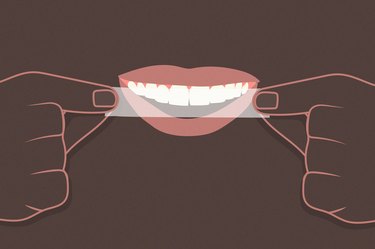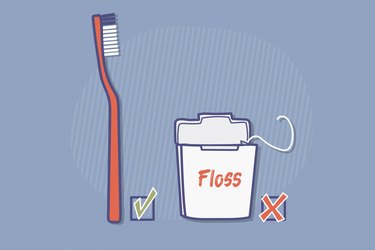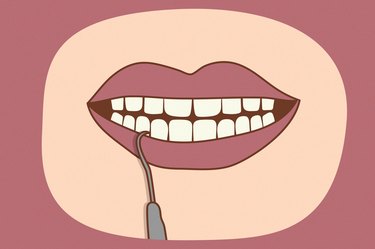
When your pearly whites are looking a little, well, less than pearly white, one of the easiest and most convenient ways to brighten them up is with over-the-counter whitening strips.
These strips have become an especially popular way to combat teeth staining. (And if you're a coffee or tea drinker, you're probably familiar with the staining effects both have on your smile.)
Video of the Day
Video of the Day
But are teeth-whitening strips safe to use? Or can they do more harm than good?
Here, Tina Saw, DDS, a dentist and oral health coach in California, explains how whitening strips work and what side effects they can cause.
How Teeth-Whitening Strips Work
Although it seems like magic, it's actually the chemicals in whitening strips that work to make your teeth brighter.
Most over-the-counter whitening strips usually contain bleaching agents like hydrogen peroxide or carbamide peroxide, which penetrate the outer layer of the teeth, Dr. Saw says.
"Once applied, the peroxide in the gel reacts with the stains on the tooth's surface and within enamel," she says.
"The oxygen molecules released during this process help to break down and dissolve molecules responsible for tooth discoloration. This chemical reaction helps lighten the appearance of teeth and remove surface stains," she explains.
Results are not immediate, and it takes a few sessions to really see a difference. Most at-home whitening systems will take at least three days to start producing results, and you might need to wait up to two weeks for full results.
The Potential Side Effects of Whitening Strips
Putting bleaching agents in your mouth might have you wondering, "are teeth-whitening strips even safe?"
Generally, yes, but according to Dr. Saw, there can be some side effects, including tooth sensitivity or potential damage to your tooth enamel.
1. Tooth or Gum Sensitivity
"If they're worn too long or get in contact with exposed tooth surfaces like dentin or the root surface, then they can cause sensitivity," Dr. Saw says.
You might also notice gum sensitivity if you have receding gums or if the whitening solution touches your gums.
2. Weakened Enamel
Damage caused by whitening strips, however, is pretty rare. But of course, that depends on how often you're using them. Like most things, they should be used in moderation.
"When used as directed, they are generally safe and do not cause permanent damage to teeth or enamel," Dr. Saw says. "Overuse, though, can cause tooth sensitivity, gum irritation or temporary enamel weakening."
When Should You Avoid Using Whitening Strips?
While you may want a sparklier smile, teeth whitening should be placed on the back burner if you have any existing dental issues, like cavities or gum disease. You'll also want to hold off on using them if you wear braces.
"It's crucial to get a healthy oral foundation before doing whitening," Dr. Saw says. "Untreated cavities, gum disease and oral issues can exacerbate these conditions and cause a lot of discomfort."
Dental issues aside, whitening strips should also be avoided if you're allergic to any of the ingredients or take medications that will interact with the whitening chemicals (ask your doctor about the latter). Make sure you carefully read the package before getting started.
Alternative Teeth-Whitening Strategies
Whitening strips aren't the only way to make your smile shine. Dr. Saw recommends these teeth-whitening tips to protect you from stains:
- Drink coffee through a straw.
- Don't constantly sip coffee, drink tea or eat darker-pigmented foods throughout the day.
- Limit how frequently you eat and drink things that cause staining.
- Brush with a whitening toothpaste once a day.
- Use an electric toothbrush, which cleans teeth better than manual toothbrushes, per the Cleveland Clinic.
- Try professional whitening at a dental office.
So, How Bad Is It Really to Use Whitening Strips?
Though teeth-whitening strips contain bleaching ingredients, they are safe to use in moderation.
You may want to limit the use of whitening strips or avoid them, however, if you have sensitive teeth/gums, have gum disease, cavities or other oral health problems.
Always talk to your dentist before trying whitening strips, and make sure any underlying oral health issues have been evaluated and treated.
Was this article helpful?
150 Characters Max
0/150
Thank you for sharing!
Thank you for your feedback!
Is this an emergency? If you are experiencing serious medical symptoms, please see the National Library of Medicine’s list of signs you need emergency medical attention or call 911.



